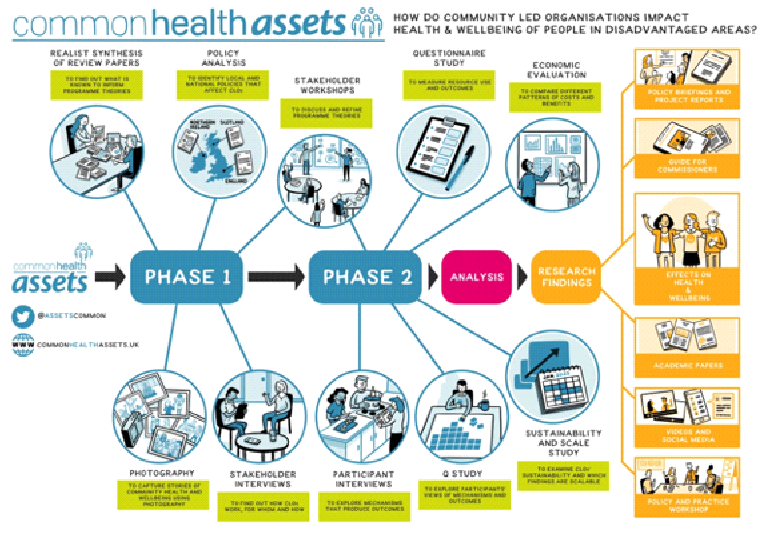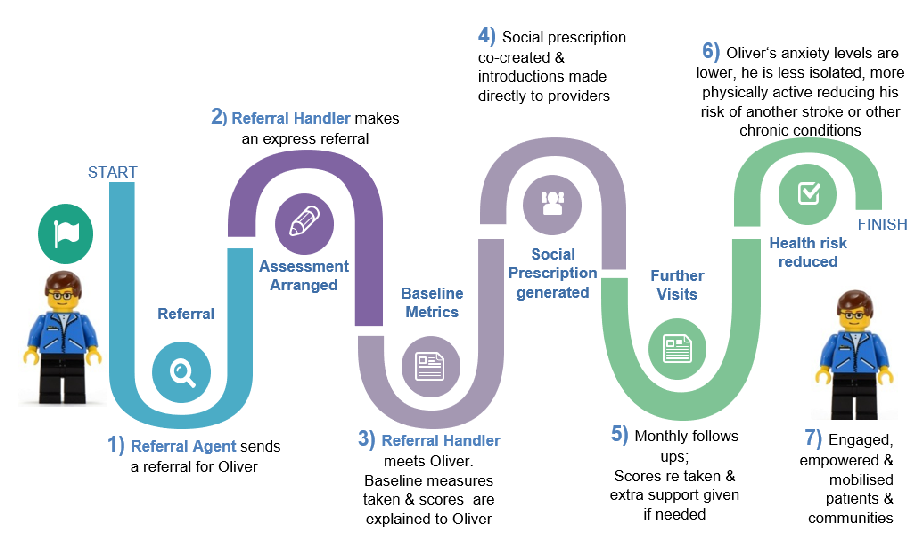

1. The CommonHealth Assets Research Programme
SCHW is actively involved in a major 3 year national research programme (Common Health Assets) funded by the National Institute for Health Research and managed and coordinated by Glasgow Caledonia University. Below is an outline of the structure and phases in the research programme. Four SCHW organisations are the Scottish delivery partners in the programme.
SUMMARY of the CommonHealth Assets Programme
The aim of this research is to find out how community organisations’ use of ‘assets based approaches’ improves health and wellbeing, and how that might be different in different contexts. Where we find positive effects we will examine whether those effects can be applied elsewhere (‘scaled up’), and how community organisations can find ways to survive (sustainability).
Assets based approaches are about ‘doing with’ (rather than ‘doing to’) and working
with communities to build on their strengths, mobilising the knowledge and skills
of local people. We will study community led organisations, or ‘CLOs’, in areas that
are often called ‘deprived’ -
Some studies have shown that community focused approaches can have a positive effect on health and wellbeing. However, research is limited and we know little about mobilising people as ‘health assets’, which approaches lead to which outcomes, and how different contexts might affect success. This research will result in new knowledge to address the gap in evidence. We will work with 15 (or more) CLOs based across England, Scotland and Northern Ireland. We will interview and run workshops with their staff and stakeholders, to find out what they already know about how programmes work, and what data they already have about their impact. We will measure outcomes, before and after participation, for 225 CLO participants to see how things change for people who connect with the CLOs in their communities. An economic analysis will estimate costs and compare those with benefits to participants. A panel of individuals with experience of living in our CLO communities will also be established to ensure the appropriateness and relevance of the research, and the interpretation and reporting of findings.
CLOs are different in different places. They are responsive to local needs, and it is unlikely that the same things work everywhere, with different people. We will use an approach called realist evaluation to develop a ‘programme theory’, of what works, for whom, in what circumstances. A range of research methods will be used to test and update the programme theory. The methods include: stakeholder interviews, a creative method called ‘Photovoice’, analysis of policies and funding streams in different places, workshops, a card sorting method called “Q”, and a survey of users to measure costs and benefits. Each method tells us something different about the CLOs and how they work, their communities, their funding and how users feel before and after taking part.
Community members, people with lived experience and people working in and with CLOs
are involved in each stage of the research, including study design and interpretation
of findings. A PPI panel will meet at each key stage, roughly every six months. Our
research team includes co-

2. The Place and Wellbeing Programme: Communities Workstream
SCHW has actively contributed to shaping the Place and Wellbeing programme over the last two years and is a member of the programme core management group.
Background
The Communities workstream is part of the Place and Wellbeing Programme that has been established by the Scottish Government as part of the Care and Wellbeing Portfolio. The workstream vision and aim are:
Vision: Strengthened capacity and relationships in communities facing the most barriers to health and wellbeing.
Aim: Empower the community and voluntary sector to act locally and complement the actions of the public sector in reducing health inequalities.
The workstream objectives are:
Objective 1: Recognise and promote the contribution of the community and voluntary sector in reducing health inequalities.
Objective 2: Increase influence of the community and voluntary sector over decisions that impact health and wellbeing within their communities.
Objective 3: Increase capacity of the community and voluntary sector (via funding arrangements) so they can realise their potential in reducing health inequalities.
Objective 4: Increase access to resources (other than funding) that will further enhance the community and voluntary sector’s capability to create the conditions for health and wellbeing within their communities.
The Place and Wellbeing Programme was established to look at what we can do at a national level to support local action to reduce health inequalities. This includes:
o Ensuring local partners have the necessary support and resources from the wider health system to effect change and achieve fairer health outcomes.
o Supporting the NHS with its role in Community Wealth Building through decisions on employment, spend and use or disposal of land and assets.
o Strengthening the capacity and relationships of community organisations so they can complement the efforts of the public sector in reducing inequalities.
A recent local engagement workshop involving community organisations from three third sector interface areas considered the three themes listed below and was intended to progress two of the objectives within the Communities workstream focused on increasing the influence of the sector and its access to resources other than funding. The workshop also engaged a range of Scottish Government policy leads and provided an opportunity to influence policy setting beyond the Place and Wellbeing Programme.
Theme 1: Influence
The aim of the influence theme was to understand participant views on how local community
organisations can better influence decision-
Theme 2: Capability
The aim of the capability theme was to understand participant views on how local community organisations and the wider public health system can support each other to reduce health inequalities.
Theme 3: Land and assets
The aim of the land and assets theme was to understand participant awareness of asset transfer, the demand from community organisations for use and/or transfer of NHS property and existing practice. Vicki Cloney from CVS Inverclyde presented on behalf of the three areas and key points included:
3. SPRING Social Prescribing Programme
The SPRING Social Prescribing programme was funded for 5 years by the National Lottery Community Fund and ended in June 2023. SCHW was the Scottish partner in SPRING and engaged 10 SCHW organisations as delivery partners. Below is a diagram of how the social prescribing process delivered by SPRING works. The evaluation report on SPRING is now available and is a rich source of information on SPRING and on social prescribing processes and the benefits SPRING produced for hundreds of individuals across 21 communities in Scotland and Northern Ireland.
“SPRING Social Prescribing and its legacy”
EVALUATION
The SPRING Social Prescribing project operated from July 2018 to June 2023. It connected
people aged 18+ to support within their community to improve their health and wellbeing.
Social Prescribers were based in 19 delivery partners, community-
The second and final evaluation report on the project by evaluators Cavanagh Kelly mainly covers the period November 2020 to December 2022. These are a few of its headline findings.
During that 2-
The most common types of interventions provided were ‘social support’ and ‘mental health’. ‘Social support’ activities include peer support, support groups, social cafes, and befriending. ‘Mental Health ‘activities include counselling, Cognitive Behavioural Therapy, meditation, and yoga.
For People – SPRING helped people to improve their health and well-
o 87% of people who completed the Warwick Edinburgh monitoring tool showed an improvement in health and wellbeing. The average improvement was 26%.
o 89% of people who completed the Outcome Star tool showed improvements, on average 32%.
For Healthcare – SPRING helped health professionals to deal more effectively with
their patients. It enabled GPs to make referrals to a joined-
For Communities – SPRING helped partners to respond to the needs of their communities.
Locating social prescribers in community settings was vital, and more cost-
The diversity of delivery partners was key to the success of SPRING. Partners demonstrated
that community-
For Government -
SPRING and SCHW were instrumental in establishing the Scottish Social Prescribing Network in June 2020. This network brings together the key players in social prescribing in Scotland and aims to share learning on social prescribing practice, policy, and strategy.
The SPRING final evaluation report report can be accessed at ( Link to Full evaluation report )

“How Social Prescribing Works”
Social prescribing at its best is not a signposting exercise or indeed a referral direct to a community service/activity etc. It involves building relationships, taking a holistic approach and engaging individuals at the heart of the process.




Contact Information:
Tel:0141-
E-
Copyright © 2014 www.schw.co.uk All rights reserved. Terms & Conditions
Registered Office:
16 Farmeloan Road
Rutherglen
G73 1DL
Registered Scottish Charity:
No SCO44327
Design by
p